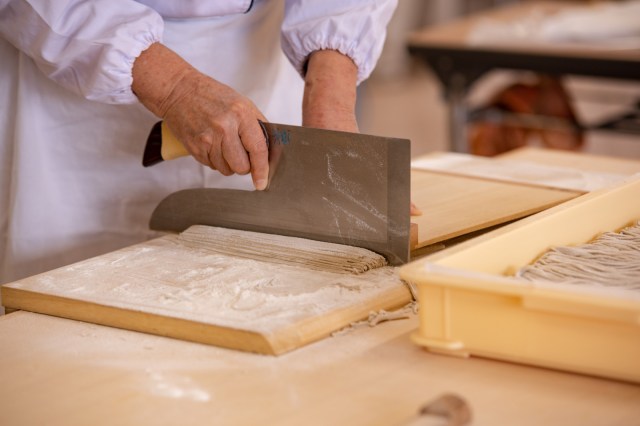
There’s one surprising aspect of working at a 120-year-old Japanese restaurant that has everyone wanting to work there.
When looking for an ideal job in Japan, or anywhere for that matter, there are a number of factors that potential recruits tend to consider. There’s the issue of remuneration, of course, along with other things like working hours, location, company reputation, and job satisfaction.
These are all things employers need to consider when placing job ads, and according to one specialist in the recruitment industry, the way you sell a job to potential new recruits can make all the difference between receiving no interested applicants and dozens of them.
The former editor of Japanese site Rikunabi Next, which specialises in company recruitment and career change assistance, recently pointed this out in a tweet that’s since gone viral on Twitter. The recruitment professional, who goes by the handle @damadama777 online, showed how a simple change in the wording of a job ad resulted in success for a soba restaurant who’d previously had no luck in finding a new employee.
本当にあった、
— 黒田真行◆採用100年史から読む 人材業界の未来シナリオ (@damadama777) February 14, 2020
蕎麦屋の「そば打ち職人」の
求人広告のキャッチコピー。
掲載1回目
「創業120年、愛され続ける老舗です」応募0名
掲載2回目
「遠方からのお客様も多い人気のお店です」応募0名
掲載3回目
「一日中誰とも話さなくていい仕事」応募50名
→いい人が採用できました!本当にありがとう!
The above tweet reads:
“This is what happened in the case of a soba noodle shop who used “soba making craftsman” as the catch copy in their recruitment advertisement.
Their first ad read, “Work at a beloved, long-standing 120-year-old restaurant.” This resulted in zero applications.
The second ad read, “Work at a popular restaurant that atracts many customers from far away.” Again, zero applications.
The third ad read, “Work at a place where you don’t have to speak to anyone all day.” This resulted in 50 applications, and a suitable employee was hired. Thank you very much!”
In this case, the restaurant owner thought they needed to sell the reputation of their restaurant in order to attract interested applicants. However, as it turns out, job hunters are more interested in being able to envision what their day-to-day work life will look like rather than simply acquiring the prestige of working at an esteemed establishment.
It’s a point that a lot of people online could relate to, leaving comments like:
“The first and second ads are just unnecessary boasting so they’re totally useless.”
“It’s more important to know what you have to do at work rather than where it is.”
“By changing the wording they’re more likely to get someone with the quiet diligence required of a soba craftsman.”
“What a nice change from the usual employers who think about what they want rather than what they can offer the employee.”
“I want to work at a place where I don’t have to talk to anybody. Should I have been a soba craftsman?”
As some people now contemplate changing careers to enter the quiet days of soba-making, there are a lot of restaurants and business owners currently looking for staff who could learn a lesson from this success story.
It just goes to show how Japanese artisans and traditional industries often need to think outside of the box in order to keep their longstanding businesses alive in today’s modern world. Unless it’s a soba restaurant where the head chef develops a buckwheat allergy. Then it’s a sad day for everyone involved.
Source: Hachima Kikou
Featured image: Pakutaso
● Want to hear about SoraNews24’s latest articles as soon as they’re published? Follow us on Facebook and Twitter!

 Tokyo restaurant doesn’t tell you its name unless you ask, makes us appreciate life’s surprises
Tokyo restaurant doesn’t tell you its name unless you ask, makes us appreciate life’s surprises “Be a blank slate”: The way to get hired in Japan?
“Be a blank slate”: The way to get hired in Japan? Check if you have a soba allergy with these amazing ukiyoe-print temporary tattoos!
Check if you have a soba allergy with these amazing ukiyoe-print temporary tattoos! Shibuya City Office serves up insanely cheap soba noodles, but are they any good?
Shibuya City Office serves up insanely cheap soba noodles, but are they any good? Saga Prefecture’s hidden gem of a soba restaurant offers scrumptious, full course soba meals
Saga Prefecture’s hidden gem of a soba restaurant offers scrumptious, full course soba meals Foreigner’s request for help in Tokyo makes us sad for the state of society
Foreigner’s request for help in Tokyo makes us sad for the state of society Japanese city loses residents’ personal data, which was on paper being transported on a windy day
Japanese city loses residents’ personal data, which was on paper being transported on a windy day Seaside scenery, history, and so many desserts on Yokohama’s Akai Kutsu【Japan Loop Buses】
Seaside scenery, history, and so many desserts on Yokohama’s Akai Kutsu【Japan Loop Buses】 Should you add tartar sauce to Japanese curry rice? CoCo Ichi makes diners an unusual offer
Should you add tartar sauce to Japanese curry rice? CoCo Ichi makes diners an unusual offer Harajuku Station’s beautiful old wooden building is set to return, with a new complex around it
Harajuku Station’s beautiful old wooden building is set to return, with a new complex around it Suntory x Super Mario collaboration creates a clever way to transform into Mario【Videos】
Suntory x Super Mario collaboration creates a clever way to transform into Mario【Videos】 Ghibli Park now selling “Grilled Frogs” from food cart in Valley of Witches
Ghibli Park now selling “Grilled Frogs” from food cart in Valley of Witches Criminals of Japan’s Edo Period Were Often Punished by Getting Face Tattoos
Criminals of Japan’s Edo Period Were Often Punished by Getting Face Tattoos Princesses, fruits, and blacksmiths: Study reveals the 30 most unusual family names in Japan
Princesses, fruits, and blacksmiths: Study reveals the 30 most unusual family names in Japan We try out “Chan Ramen”, an underground type of ramen popular in the ramen community
We try out “Chan Ramen”, an underground type of ramen popular in the ramen community McDonald’s new Happy Meals offer up cute and practical Sanrio lifestyle goods
McDonald’s new Happy Meals offer up cute and practical Sanrio lifestyle goods Japanese ramen restaurants under pressure from new yen banknotes
Japanese ramen restaurants under pressure from new yen banknotes French Fries Bread in Tokyo’s Shibuya becomes a hit on social media
French Fries Bread in Tokyo’s Shibuya becomes a hit on social media Studio Ghibli releases new action figures featuring Nausicaä of the Valley of the Wind characters
Studio Ghibli releases new action figures featuring Nausicaä of the Valley of the Wind characters Red light district sushi restaurant in Tokyo shows us just how wrong we were about it
Red light district sushi restaurant in Tokyo shows us just how wrong we were about it New private rooms on Tokaido Shinkansen change the way we travel from Tokyo to Kyoto
New private rooms on Tokaido Shinkansen change the way we travel from Tokyo to Kyoto Tokyo Tsukiji fish market site to be redeveloped with 50,000-seat stadium, hotel, shopping center
Tokyo Tsukiji fish market site to be redeveloped with 50,000-seat stadium, hotel, shopping center Beautiful Ghibli sealing wax kits let you create accessories and elegant letter decorations【Pics】
Beautiful Ghibli sealing wax kits let you create accessories and elegant letter decorations【Pics】 Studio Ghibli releases Kiki’s Delivery Service chocolate cake pouches in Japan
Studio Ghibli releases Kiki’s Delivery Service chocolate cake pouches in Japan New definition of “Japanese whiskey” goes into effect to prevent fakes from fooling overseas buyers
New definition of “Japanese whiskey” goes into effect to prevent fakes from fooling overseas buyers Our Japanese reporter visits Costco in the U.S., finds super American and very Japanese things
Our Japanese reporter visits Costco in the U.S., finds super American and very Japanese things All-you-can-drink Starbucks and amazing views part of Tokyo’s new 170 meter-high sky lounge
All-you-can-drink Starbucks and amazing views part of Tokyo’s new 170 meter-high sky lounge More foreign tourists than ever before in history visited Japan last month
More foreign tourists than ever before in history visited Japan last month New Pokémon cakes let you eat your way through Pikachu and all the Eevee evolutions
New Pokémon cakes let you eat your way through Pikachu and all the Eevee evolutions Disney princesses get official manga makeovers for Manga Princess Cafe opening in Tokyo
Disney princesses get official manga makeovers for Manga Princess Cafe opening in Tokyo Sales of Japan’s most convenient train ticket/shopping payment cards suspended indefinitely
Sales of Japan’s most convenient train ticket/shopping payment cards suspended indefinitely Sold-out Studio Ghibli desktop humidifiers are back so Totoro can help you through the dry season
Sold-out Studio Ghibli desktop humidifiers are back so Totoro can help you through the dry season Japanese government to make first change to romanization spelling rules since the 1950s
Japanese government to make first change to romanization spelling rules since the 1950s Ghibli founders Toshio Suzuki and Hayao Miyazaki contribute to Japanese whisky Totoro label design
Ghibli founders Toshio Suzuki and Hayao Miyazaki contribute to Japanese whisky Totoro label design Doraemon found buried at sea as scene from 1993 anime becomes real life【Photos】
Doraemon found buried at sea as scene from 1993 anime becomes real life【Photos】 Tokyo’s most famous Starbucks is closed
Tokyo’s most famous Starbucks is closed One Piece characters’ nationalities revealed, but fans have mixed opinions
One Piece characters’ nationalities revealed, but fans have mixed opinions We asked a Uniqlo employee what four things we should buy and their suggestions didn’t disappoint
We asked a Uniqlo employee what four things we should buy and their suggestions didn’t disappoint Why did this stand-and-eat soba noodle shop in Tokyo open in the middle of the pandemic?
Why did this stand-and-eat soba noodle shop in Tokyo open in the middle of the pandemic? Pantene ad asks why people in Japan are forced to look the same when job hunting
Pantene ad asks why people in Japan are forced to look the same when job hunting Japanese clothing chain offers an answer to job-hunting suit conundrum
Japanese clothing chain offers an answer to job-hunting suit conundrum How to turn a classic Japanese noodle dish into Studio Ghibli’s Totoro
How to turn a classic Japanese noodle dish into Studio Ghibli’s Totoro Robot-operated soba stand in Tokyo is too busy for its machine chef to keep up with
Robot-operated soba stand in Tokyo is too busy for its machine chef to keep up with We visit a ramen bar in Croatia, meet a whole new version of ramen we can’t wait to make at home
We visit a ramen bar in Croatia, meet a whole new version of ramen we can’t wait to make at home We find Italian Soba at an Aomori fish market that insisted it’s perfect for the beach
We find Italian Soba at an Aomori fish market that insisted it’s perfect for the beach How to make noodles look restaurant quality in just three seconds
How to make noodles look restaurant quality in just three seconds Japanese new recruit fired after one month for being partially out of frame during video meetings
Japanese new recruit fired after one month for being partially out of frame during video meetings Marvelous Soba: Colour-changing noodle broth creates a twist ending to your meal
Marvelous Soba: Colour-changing noodle broth creates a twist ending to your meal Kakiage towers and Italian soba? We try out a unique soba restaurant in Tokyo
Kakiage towers and Italian soba? We try out a unique soba restaurant in Tokyo Survey says more sixth graders in Japan aspire to work in medicine this year than last year
Survey says more sixth graders in Japan aspire to work in medicine this year than last year What the heck is okame soba?
What the heck is okame soba? Old Japanese photos show the awesome skill of soba delivery workers in the Showa era
Old Japanese photos show the awesome skill of soba delivery workers in the Showa era Want some carbs with your carbs? Japanese noodle restaurant offering bread soba
Want some carbs with your carbs? Japanese noodle restaurant offering bread soba Vending machine noodle ice cream: A retro icon in Japan brings joy to a new generation
Vending machine noodle ice cream: A retro icon in Japan brings joy to a new generation
Leave a Reply